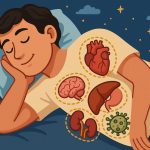Morning rituals are structured habits or actions people perform at the start of the day. Though they vary by culture and individual preference, research shows that consistent morning routines can have measurable benefits on mental, physical, and emotional health. These rituals help regulate internal systems, optimize energy levels, and promote healthier decision-making throughout the day. Their importance lies not in the specific activities chosen, but in the consistency and structure they provide to the brain and body.
Regulating the Circadian Rhythm
Morning routines are closely tied to the body’s circadian rhythm—the internal biological clock that governs sleep, hormone release, body temperature, and digestion. Starting the day with consistent activities like waking up at the same time, getting sunlight, and eating breakfast helps synchronize this rhythm.
A stable circadian rhythm improves sleep quality, metabolic efficiency, and hormonal regulation. Disruption of this rhythm, by contrast, has been associated with insomnia, mood disorders, and immune dysfunction. Morning rituals help anchor the body in time and reinforce the day–night cycle, especially when combined with exposure to natural light.
Boosting Cognitive Function and Focus
Engaging in purposeful activities after waking up—such as light movement, journaling, hydration, or reading—can activate the prefrontal cortex, the part of the brain responsible for planning, attention, and decision-making. Starting the day with focus-enhancing rituals primes the brain for productivity.
Cognitive benefits are enhanced when the brain is not overwhelmed with stress or multitasking. Structured mornings reduce decision fatigue, allowing more mental energy to be used on complex tasks later in the day. This is why many professionals and students benefit from fixed early-day habits.
Hormonal Balance and Energy Regulation
Morning behavior influences the release of key hormones such as cortisol, insulin, and serotonin. Cortisol levels naturally peak in the early hours as part of the body’s wake-up signal. When aligned with routine, this surge supports alertness and readiness.
Skipping morning rituals or waking unpredictably can blunt cortisol response and affect glucose metabolism. In contrast, exposure to light, light physical activity, and structured nourishment help regulate energy and mood-stabilizing hormones for the rest of the day.
Supporting Digestive and Metabolic Health
Eating breakfast as part of a morning ritual supports gastrointestinal motility, activates digestive enzymes, and prepares the body for nutrient absorption. Regular meal timing improves insulin sensitivity and helps control blood sugar fluctuations.
Individuals who maintain structured breakfast routines often have healthier lipid profiles and body weights compared to those who skip breakfast or eat at irregular times. Combined with hydration, morning nourishment is a cornerstone of metabolic rhythm.
Mental Health and Emotional Resilience
Morning rituals also provide a foundation for emotional regulation. Predictability and control in the early hours reduce anxiety and enhance self-efficacy. Whether it’s a mindfulness practice, stretching, or simply making the bed, these actions contribute to psychological stability.
Consistent routines reduce stress hormone levels and increase the production of dopamine and endorphins, enhancing feelings of reward and accomplishment. People who start their days with intentional actions are more likely to maintain healthy behaviors across the day.
Conclusion
Morning rituals influence core aspects of physical and mental well-being, from circadian alignment to hormonal regulation and cognitive readiness. By engaging in consistent early-day habits, individuals support their internal biology and improve health outcomes over time. These effects are cumulative and long-lasting, making the morning one of the most influential times of day for personal health management.
Glossary
- Morning rituals — consistent activities performed after waking that support daily structure and well-being.
- Circadian rhythm — the body’s internal clock that regulates sleep-wake cycles and physiological processes.
- Prefrontal cortex — a region of the brain responsible for focus, planning, and decision-making.
- Cortisol — a hormone that regulates stress response and energy levels.
- Insulin sensitivity — the body’s responsiveness to insulin, important for blood sugar control.
- Digestive enzymes — proteins that help break down food in the digestive tract.
- Psychological stability — emotional resilience and consistent mental performance.
- Decision fatigue — mental exhaustion caused by making too many choices over time.


